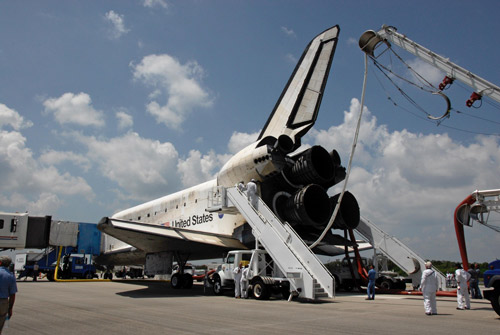NASA Needs Extra Billions to Replace Shuttle Fleet on Time

NASAwill need billions of dollars in additional funding to keep its currentschedule for both retiring the space shuttle next year and for bringing itsreplacement, the Constellation program, online by 2015, according to a reportreleased Thursday by federal budget watchdogs.
TheCongressional Budget Office analyzed several budget scenarios for carrying outthe spaceexploration plan announced in 2004 by then-President George W. Bush.
Eachscenario predicted schedule slips, unless NASA received increasing funding.
"IfNASA's funding was maintained at $19.1 billion annually and the agency realizedcost growth in its programs consistent with the average for 72 of its pastprograms, its planned schedules for spaceflight programs would bedelayed," the report said.
Italso addressed the schedule for the shuttle's replacement, the Constellationprogram, which is expected to send Americans back into space in 2015 in the new Aresrocket and Orion space capsule.
Withcurrent funding levels, "the initial operating capability for Ares 1 andOrion would be pushed to late 2016; the return of humans to the moon would slip(from 2020) to 2023; and 15 of 79 science missions would be delayed beyond2025," the report said.
TheCongressional Budget Office also listed other scenarios. They are:
Breaking space news, the latest updates on rocket launches, skywatching events and more!
IncreasingNASA funding to $23.8 billion, which would allow the agency to close theexpected five-yeargap in manned spaceflight by keeping the space shuttles flying to 2015.Under this plan, the United States also would extend support for theInternational Space Station for another five years, to 2015.
RaisingNASA funding to $21.1 billion. This would allow Constellation to stay onschedule and the shuttlesto retire next year. However, this plan would cut 15 of the sciencemissions NASA currently has planned, or delay them until after 2025.
- Video - NASA's Constellation Journey Begins: Part 1, Part 2
- End in Sight: Final Space Shuttle Missions Slated
- NASA's Shuttle Fleet Celebrates 25 Years of Spaceflight
Publishedunder license from FLORIDA TODAY. Copyright ? 2009 FLORIDA TODAY. No portion ofthis material may be reproduced in any way without the written consent of FLORIDA TODAY.
Eun Kyung Kim is a former writer for Space.com where she contributed articles on human spaceflight, space exploration, and NASA's space shuttle program. Additionally, her work has been seen in the Washington Post, American Heart Association News, Bloomberg Government and many other publications after working as a staff reporter for The Associated Press, Gannett, the St. Louis Post-Dispatch, and the Ft. Worth Star-Telegram.
